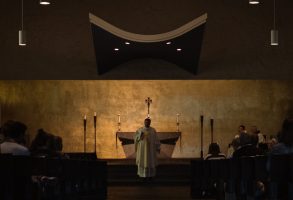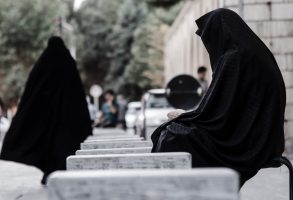Luma Simms
Fellow
Luma Simms, a Fellow at the Ethics and Public Policy Center, studies the life and thought of immigrants. As a humanist writer, she publishes on a broad range of topics, with a focus on the human (individual and communal), ethical, religious, and philosophical dimensions of immigration. She is particularly concerned with the crisis of rootlessness, identity, and dehumanization.
Luma Simms, a Fellow at the Ethics and Public Policy Center, studies the life and thought of immigrants. As a humanist writer, she publishes on a broad range of topics, with a focus on the human (individual and communal), ethical, religious, and philosophical dimensions of immigration. She is particularly concerned with the crisis of rootlessness, identity, and dehumanization.
Mrs. Simms’s essays, articles, and book reviews have appeared in a variety of publications including National Affairs, The Wall Street Journal, The Point magazine, Public Discourse, Law and Liberty, the Institute for Family Studies, and others. She has been interviewed on Arabic television and American and Canadian radio on topics such as religious freedom in the Middle East, Congress and DACA, immigration and the Middle East, divorce, parenting, and elder care in Eastern cultures. Before joining EPPC, Mrs. Simms was an Associate Fellow at The Philos Project where her research and writing focused on a Christian presence in the Middle East, anti-Semitism, and immigrant life and thought.
Some of Mrs. Simms’s notable essays include Identity and Assimilation at National Affairs; Immigration and the Desire for Rootedness at Public Discourse; I Am My Enemy: A Naturalized American Finds Herself at War with Her Homeland at Plough Magazine; and Thinking Is Self-Emptying at The Point magazine.
Her background includes a Bachelor of Science degree in physics from California State Polytechnic University, Pomona. She studied law at Chapman University School of Law before leaving to become an at-home mom. Mrs. Simms was born in Baghdad, Iraq; her parents and ancestors are from Mosul, and she speaks Arabic with a Moslawi dialect.
We Will Not Yield
Luma Simms

What Newman said of his day is also true of our own: “The Catholic people, in the length and breadth of Christendom, were the obstinate champions of Catholic truth, and the bishops were not.”
Articles
First Things / September 11, 2018
Fathers, Help Us
Luma Simms

A plea to bishops and priests: defend this Church; defend the bride of Christ. Militate against this cancer in your midst.
Articles
First Things / August 21, 2018
How the Trend of Young Adults Living With Their Parents Could Boost Social Capital
Luma Simms

The American way is to view young adults still at home as a troubling trend; whereas, in the Middle Eastern culture, this extra time at home is a way to expand the social and economic capital of the family.
Articles
Institute for Family Studies / August 14, 2018
No, The Catholic Church’s Support Of Celibacy Doesn’t Make It Like Feminism
Luma Simms

A new book by a Reformed Protestant author is poorly sourced and poorly argued, and makes many unfounded claims in its attempt to link the Catholic Church with the ills of feminism.
Articles
The Federalist / May 16, 2018
How to Make a Caring and Critical Assessment of Pope Francis
Luma Simms

A new collection of essays offers up illuminating and respectful critiques of Pope Francis’ attitudes toward capitalism.
Articles
The Federalist / May 4, 2018
If You Stumble in the “Success Sequence,” a Strong Family Can Lift You Up
Luma Simms

Wealth is not just economic, but familial—that is, someone can be rich in the strong bonds of family and community without necessarily being rich in money. For many in the immigrant subculture, the family is strong enough to withstand a misstep in the success sequence.
Articles
Institute for Family Studies blog / April 17, 2018
The Road to Iranian Democracy
Luma Simms

A new book on the movement toward democracy in Iran is meticulous, bordering at times on repetitive. Yet it is a compelling description of the paths of democratization in developing countries, and of the Iranian situation in particular.
Articles
Law and Liberty / April 9, 2018
I First Read Humanae Vitae as a Protestant. Its Truthfulness Made Me Weep.
Luma Simms

The world is full of lonely souls who need a beacon in their darkness, an ointment for their wounds, and a means of grace for their bereft spirits. For many, Pope Paul VI’s encyclical Humanae Vitae has been all that and more.
Articles
Catholic Herald (UK) / April 6, 2018
Identity and Assimilation
Luma Simms

Assimilation has proven so difficult lately not because American culture is too cohesive and self-confident but because it has lost the capacity to tell its own story coherently.
Articles
National Affairs - Spring 2018 issue / March 21, 2018
Loneliness Is Fueling The Opioid Epidemic. Here’s How You Can Help.
Luma Simms

Social despair more so than economic despair is the main driver behind our current opioid crisis; the task before us looms large, but there is a way to repair and rebuild social capital.
Articles
The Federalist / March 20, 2018
Is Immigration Good for Immigrants?
Luma Simms

When immigration is not a free choice, when it is undertaken because of violence and fear, it is not an unqualified good for either the immigrant or the adoptive country.
Articles
National Review Online / March 17, 2018
Correcting for the Historian’s Middle Eastern Biases
Luma Simms

Eugene Rogan’s The Arabs: A History will be of value to readers who wish to understand the Arab world the way Arabs want to be understood. As history it is fabulous, but as analysis, it has a certain bias that I found frustrating as an Arab Christian.
Articles
Law and Liberty / March 5, 2018